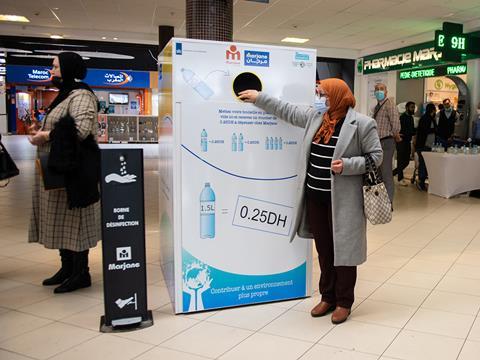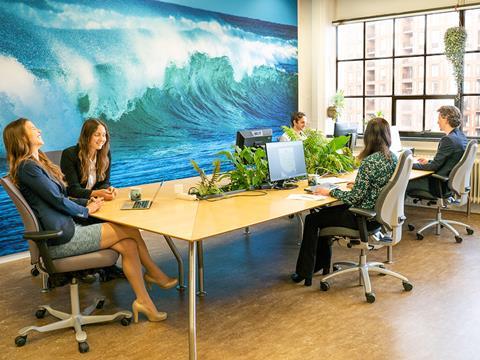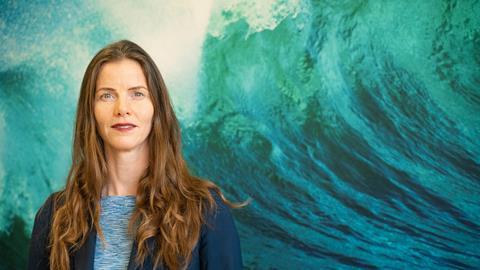Everyone in the packaging industry is concerned with the issue of plastic pollution in the ocean. We have all heard the harrowing statistics, and everyone wants to play a part in helping to manage the problem and create a circular economy for plastics. But for Willemijn Peeters, tackling ocean plastics became her entire work’s mission in 2016 when she started Searious Business with the aim of using upstream innovation to prevent new plastics from entering the ocean. Today, the company works with big brands such as Unilever and Danone to help them make their products more circular.
“I get really triggered by the ocean,” she says. “It’s the life support system for our world… and we treat it like it’s the gutter of our society.” For Peeters, plastic waste is not just a pressing problem but also a genuine opportunity to help businesses innovate and find creative solutions that will help protect the ocean. “If you look at all the challenges, plastic stands out for me because it’s a material that’s not supposed to be in the environment,” she adds. “It’s something nobody wants to see in the ocean- not the companies that have their logos on it, not the consumers, nobody wants to see it out there- so that’s the opportunity.”
Peeters answers my call from their new office in Eindhoven, apologizing for any noise from the final redecorating taking place. She is sitting in front of the lit slate wall from where she accepted the first-place award in the ‘Best Practice’ category at the Sustainability Awards 2021. The prize was for Searious Business’s collaboration with large supermarket chains in Morocco, helping them reduce the amount of plastic that ends up littering the environment. But, she explains, most of the work that the company does is in Europe.

Before she started Searious Business, Peeters was running national programs enabling companies and entrepreneurs to improve the sustainability of their businesses. “I was really quite successful in changing companies’ behaviours, and at a certain point I noticed that wasn’t fuelling me enough anymore, like I wouldn’t get so passionate anymore,” she says.
It only takes a few minutes of speaking to her to understand that she has found her reason to get up in the morning in her current work. “I didn’t know anything about plastics when I started, but I knew I wanted to change it,” she tells me. “People say sometimes say I’m like Pipi Longstocking because she said, ‘I’ve never done it, so I think I can do it,’ and that’s a bit like me, I feel the same.” Apart from the ginger braids, I can see the resemblance.
And there have been plenty of occasions for Peeters to demonstrate her perseverance. “Actually, my brother sent me a link to the 10 pitfalls for start-ups after the first year, and I said, ‘I wish you sent it to me sooner’, I think I’d made 8 out of the 10,” she says. “But I never Googled, it never occurred to me to Google for a pitfall from a start-up because I am not going to fail; I am just going to go on until I succeed!”
It’s a challenging job, she tells me, because companies do not turn to Searious Business for help with the simple problems that they can manage through their own teams. “We get the hard stuff,” she comments, “and still, we have a lot of fun doing it, because you can see it pays off.” This mentality is shared by her team and has been key in enabling them to find the right solutions for each challenge they are presented with.

But Peeters is certainly not oblivious to the magnitude and severity of ocean plastics. “I think the plastic that’s already out there in the environment will degrade and break up into very, very small pieces, like fog… and how do you ever get fog out of the ocean,” she asks. “But I’d rather be part of the solution than the problem, and I want to make sure that no more ends up in there, and if there’s anything that I can do within my skills and my network, I will do it.”
Accomplishing all that she has set out to do requires her not to have a nine-to-five mentality. She maintains a work-life balance by prioritizing spending time with her two children. When I ask if taking time to log off is realistic for her, she laughs and says: “Totally, totally. Cause I’m the chief, right?” On weekends and holidays, or when she picks her children up from school, she is “just mum”, not the founder and director of Searious Business, or “the captain of the change-making ship”, as she is called on their company website.
Although playing tag is her top priority when taking time off work, she often cannot help getting distracted by packaging, the plastic on the labels of teabags or the single-use plastic spoons. Her children have also started noticing packaging and being aware of its impact. “My daughter one day convinced me to talk to one of one of our current clients, it was the gingerbread manufacturer,” Peeters tells me. “She said, ‘You should actually talk to this boss’, and I said, ‘Okay, I’ll go and talk to the boss of the gingerbread factory for you,’ and then he was really happy I did, and now he’s a client!”
Peeters explains how important it has been having people in her life that have helped her through the challenging moments of running Searious Business. “I have a lot of sweet people around me that are there for me if times get rough, because they do,” she says. “I couldn’t have done this all by myself, I think it’s always an ecosystem of people around you that encourage you and are there to support you.”

















